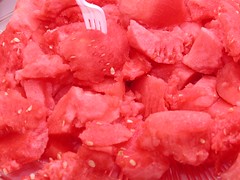
Question: Will Drinking Water Improve Skin Hydration?
Answer: No.
It’s an old wives’ tale actually.
Now, there are many good reasons to drink water, like to quench your thirst and help your brain function. Water maintains energy levels, helps regulate body temperature, aids in digestion and absorption of vitamins and minerals, and can help you loose weight (it satisfies your satiety center).
What experts say

But…“humans aren’t like plants. Our skin doesn’t perk up when we consume water,” says dermatologist Dr. Katie Rodan. In fact, when you ingest it, “water doesn’t go straight to the skin,” she says. “It goes through the intestines, gets absorbed into your bloodstream, and is filtered by the kidneys. Then it hydrates cells.” So, when it comes to moisturizing skin, drinking water falls short.
Esthetician Renee Rouleau agrees. “Your skin cells need water to live. But did you know that drinking water is the least efficient way to hydrate the skin? The hydration levels of your skin have more to do with how you treat your skin topically.” Turns out moisturizers are still the best way to improve dry and dehydrated skin and barrier function.
In 2007 The Discovery Health Channel® debuted a major five-part series called “The Truth About Food,” hosted by Dr. Mehmet Oz. In a survey for the series, 85% of people said they think they should drink at least a half-gallon of water each day to keep their skin looking young. To bust the myth, Dr. Oz performed a very small experiment where he had twin girls eat the same diet while one drank a lot of water and the other drank none. The results showed that drinking lots of water each day does not have an effect on your skin. Dr. Oz explained that we get a lot of water from the foods we eat every day and the effects of the extra water are negligible.
Diet Can Affect Skin Hydration

Your genes largely determine your skin type. That natural moisture level then fluctuates depending on what your skin’s protective lipid barrier is exposed to. That said, your diet may still have an effect on your skin, according to Leslie Baumann, a professor of dermatology at the University of Miami Florida. Foods rich in the essential fatty acids found in walnuts, flaxseed, salmon, and olive oil can help skin cells stay hydrated.
A study by the Institute of Experimental Dermatology, in Germany, revealed that women who took flaxseed- or borage-oil supplements (2.2 grams a day) for 12 weeks experienced a significant increase in skin moisture and a reduction in roughness. A healthy diet with three to five servings a week of fatty acids will suffice for the average person, says Baumann.
And as in the study, it’s easy to get them by taking them as supplements, such as Nature’s Bounty Fish Flax Borage Omega 3-6-9 ($12.35 at Amazon.com).
Drinking Water Does NOT Improve Acne

And if drinking water doesn’t hydrate your skin, it won’t improve acne either. Another old wives’ tale! No, drinking water does not help reduce acne or oily skin or oil production or unclog pores. Nor does it “flush acne-causing toxins from your body” (yes, I really read this on several web sites!). I mean, sure, it’s always better to drink water than soda, but if you’re looking for help managing your acne, it’s far more effective to consider taking a look at your diet.
[Read More: How Does Food Influence Acne?: The Scary Truth About Dairy Products, Sugar, and Iodine]
Bottom Line
Want soft, supple skin? Drinking water isn’t likely to get you there. Studies have shown that this one is an old wives tale and won’t give you smoother skin or make your acne better. Instead try changing your diet to include fatty acids and getting a great moisturizer.
[Read more: What are the Differences between Occlusive, Humectant, an Reparative Moisturizers?]

